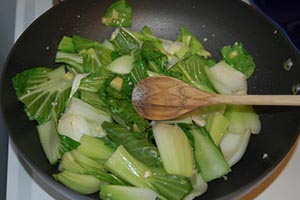Selection and storage
Although bok choy can be available year-round, it is at its best during the winter season. In the markets, buy fresh harvest featuring firm stalks and dark green crispy, flavorful leaves. Avoid slump plants with leaves wilted and lost their luster.
Once at home store whole pak choi (bok-choy) in a vegetable compartment inside the refrigerator, set at high relative humidity. If stored appropriately, it stays fresh for up to 3-4 days without loss of nutrients. However, pak choi is more nutritious, sweeter, and flavorful when used fresh.
Preparation and serving methods
Trim off at its base and remove discolored outer leaves. Wash it in cold water. Gently pat dry or place it upside down until all the water drains out.
To prepare, separate the outer stalks from the base using a paring knife and divide the whole plant into halves lengthwise. Then, chop off from the stem end about an inch apart and work towards its leafy top. Add it to a variety of recipes, either combined with other vegetables or enjoy all alone in stir-fry or soup.
Here are some of the preparation tips:
 |
| Bok choy stir-fry with ginger, garlic, soy sauce, and a bit of chili paste. Courtesy: Scott |
-
Crispy, sweet bok choy stalks can be eaten raw, and added to salads, sandwiches, and burgers.
-
Its stalks can be mixed well with cabbage in coleslaw.
-
Baby bok choy can be a very attractive addition to salads and stir-fries.
-
Pechay-ginisang (sauteed bok choy) is a popular stir-fry dish among Filipinos.
-
In the Korean peninsula, it is employed much like napa cabbage in the preparation of “bok-choy kimchi”.
-
In China and other East Asian regions, it is used much like cabbage in stew fries with added onion, garlic, bell pepper, and green chilies mixed with steamed rice and soy/chili/tomato sauce to prepare chowmein (Chaomiàn).
-
Pak choi is one of the wonderful vegetables used generously in modern-day recipes like stir-fries, soups, and stuffings.
-
It complements well with cabbage, chilies, capsicum, onion, ginger, garlic, rice, tofu, seafood, meat and poultry.
Safety profile
Like in cabbage, bok choy also contains certain chemical compounds known as “goitrogens.” These plant-based compounds are found abundantly in Brassica/cruciferous vegetables like cauliflower and broccoli. Prolonged consumption of vegetables high in goitrogens may lead to swelling of the thyroid gland, a condition known as goiter. It is, therefore, advised that some individuals with thyroid dysfunction limit the consumption of brassica family vegetables in their food. However, they may be consumed without any reservations by healthy individuals. (Medical disclaimer).
Also read ≻≻-
≻≻- Napa cabbage nutrition facts.
≻≻- Komatsuna nutrition facts.
≺≺ Tatsoi (Tai cai (塌菜)) Nutrition facts.
≻≻- Cabbage nutrition facts.
≻≻- Back to Vegetables from Bok Choy. Visit here for an impressive list of vegetables with complete illustrations of their nutrition facts and
health benefits.
≻≻- Back to Home page.
Further Reading:
Chinese cabbage-Agri life extension-Texas A&M Sysstem.-pdf.
USDA National Nutrient Database.













